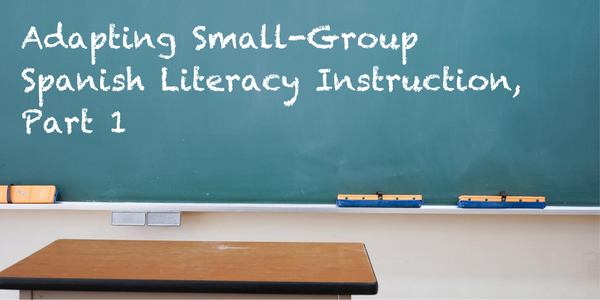 Due to the popularity of our posts on the role of
parental involvement in children's literacy
, which present ideas for Family Literacy Workshop activities taken from
Family Literacy Workshops
for Preschool through Grade 6: A Research Based Approach
, we've decided to keep the subject a recurring topic here on our blog, with a new post every week or so offering new free activity downloads and further instruction on
how to hold successful family literacy workshops at your school.
Most Tuesdays for the next few months, you can check back here and find this kind of content. You can see the earlier posts
here.
Due to the popularity of our posts on the role of
parental involvement in children's literacy
, which present ideas for Family Literacy Workshop activities taken from
Family Literacy Workshops
for Preschool through Grade 6: A Research Based Approach
, we've decided to keep the subject a recurring topic here on our blog, with a new post every week or so offering new free activity downloads and further instruction on
how to hold successful family literacy workshops at your school.
Most Tuesdays for the next few months, you can check back here and find this kind of content. You can see the earlier posts
here.
In last week's post, we looked at some obstacles to family literacy, and went over the first few agenda items for the second workshop. Today, we will present the remaining agenda items from that workshop, and also give you two downloadable take-home activities. These activities are great, because they are versatile enough to be used as in-class group-work lessons if you'd rather do that than hold the whole workshop. Here's a brief description for the activities, which can be downloaded for FREE at the bottom of the page:'
Write Your Own Read Aloud
This activity addresses Writing Strategies, Writing Application, and Written and Oral English Language Conventions by creating a read aloud that the family can read and enjoy together.
Illustrate Your Own Read Aloud
This activity addresses Reading Comprehension, and Listening and Speaking Strategies by reading and responding to a story through the creation of illustrations.
Workshop #2: Reading With Your Children
Remaining Agenda Items

4) Reading Process Activity
Make overhead transparencies of "I Can Play" (included in last week's download ). This activity will be used to help parents understand some of the strategies children use when they read. Though this is a challenging activity, many teachers have found this simulation to be an effective way for parents to think about what their children are trying to do when they read.
5) Review of Strategies Used During a Read Aloud
During this part of the workshop, the workshop leader should help parents understand that during a read aloud their child should be encouraged to ask questions and help with as much of the reading as possible. Let them know that it is acceptable to stop the story if the child has a question or comment. Parents should be urged to read the book before they read it with their child. This will help make sure that they are able to answer the child’s questions about vocabulary and the themes of the book.
Let parents know they may support the reading in a variety of ways:
Non-readers and emergent readers – Parents will assume the majority, if not all, of the reading responsibility.
Beginning readers – Parents will read the story to the child, while the child is encouraged to read words that he or she knows.
More proficient readers – The child should read aloud to the parent, and the parent should provide corrective feedback as the child reads.
 The
Parents' Guide to an Interactive Read Aloud
(the topic of next week's post) can be used to introduce parents to the procedures for an interactive read aloud. Before beginning the discussion, hand out this guide so that they may follow along. Answer any questions that the parents have regarding the general procedures.
The
Parents' Guide to an Interactive Read Aloud
(the topic of next week's post) can be used to introduce parents to the procedures for an interactive read aloud. Before beginning the discussion, hand out this guide so that they may follow along. Answer any questions that the parents have regarding the general procedures.
Before the Read Aloud
- Choose a book that is interesting to both the parents and children. Help parents remember to keep in mind things that may or may not be familiar to their child, and topics that they may need to be clarified during the read aloud.
- Parents should be reminded to read the story ahead of time and to think about words in the story that their child may not know. They can choose some of those words to clarify for their child, and try and use in their informal conversations with their child.
During the Read Aloud
- Remind parents that their enthusiasm is contagious. The more excited they are to be reading the book, the more excited their child will become. This might include using different voices for the various characters.
- Parents should be encouraged to stop the read aloud occasionally to ask their child what he or she thinks is going to happen. During the pre-reading of the book, the parent may have identified turning points in the story that are perfect opportunities for these kinds of questions.
- Parents should also use the sample guestions in the Parents' Guide to an Interactive Read Aloud (featured in next week's post) during the read aloud.
After the Read Aloud
- Instead of just closing the book, suggest that parents revisit some of the new vocabulary words that they may have discussed with their child.
- The parents should ask their child questions in order to gauge how well their child understood the story (see Check for Understanding in the parent guide).
Let the parents know that it is acceptable and they should be encouraged to re-read the same story again and again. This helps reinforce the vocabulary and text structures present in the story.
Below are this week's take-home activities to download. Remember to check back next Tuesday for the remaining take-home activities for this workshop, and to find out what's in the Parents' Guide to an Interactive Read Aloud .
- Tara Rodriquez







